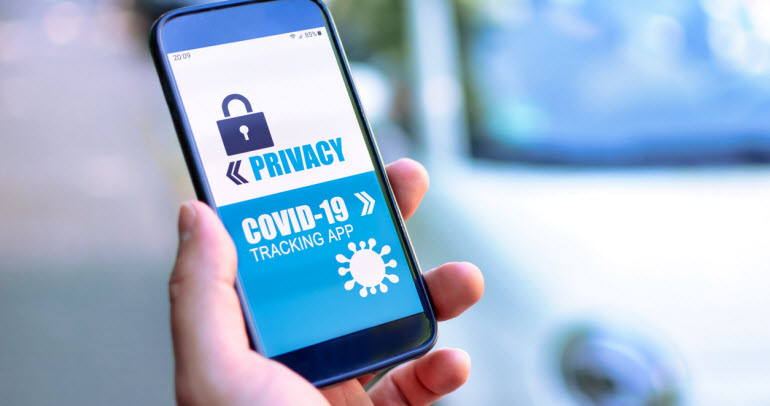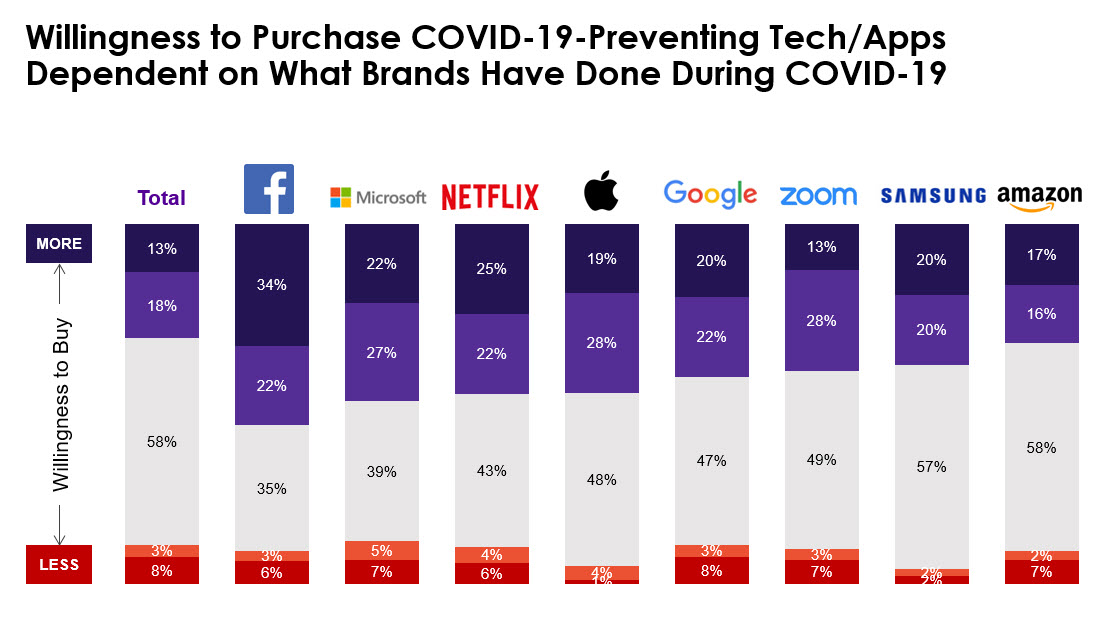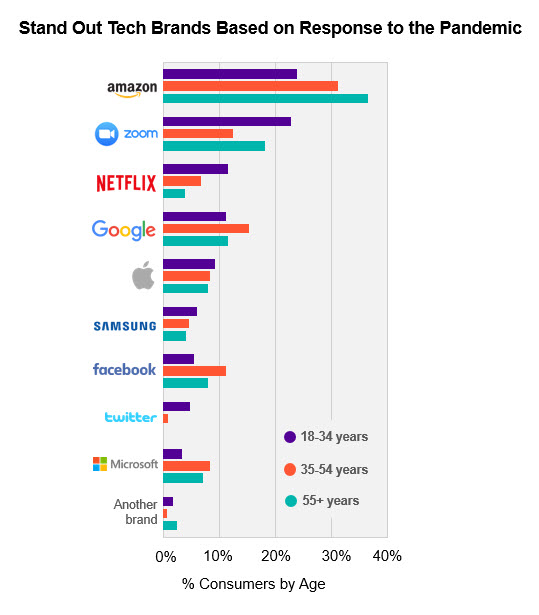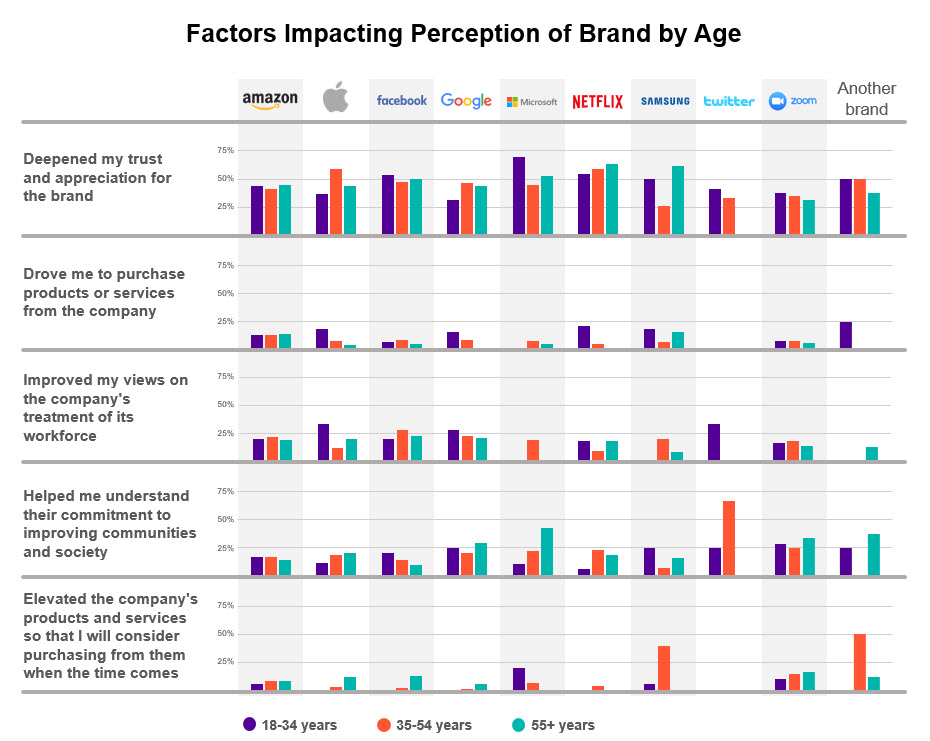
A short time ago big tech brands such as Microsoft, Google, Amazon, Apple and Facebook were making headlines for issues related to antitrust, privacy and security. But in the midst of a pandemic, these brands are being viewed in a more positive light—as potential leaders in the fight against COVID-19.
As the virus took hold, Microsoft protected its workforce by continuing to pay hourly workers their full wage despite reduced need for services. Amazon committed to hiring 100,000 workers to meet increased online demand. And rivals Google and Apple teamed up to develop contact tracing technology designed to stop the spread of the virus while protecting consumer privacy.
In addition, Netflix made adjustments to their network infrastructure to keep the content flowing to locked-down consumers and make it easier for content producers to work at home. And Facebook—which consumers are watching closely to make good on its promise—pledged to amplify its efforts at curbing misinformation about the virus on its platform.
With tech brands stepping up to do their part in reining in and mitigating the effects of the pandemic, Escalent set out to discover if these actions are influencing consumers’ perceptions of these companies.
To do that, our technology team surveyed a national sample of 1,432 consumers age 18 and older from May 20 to June 1, 2020. Here’s what we found:
- Consumers appreciate brands that step up. Consumers are noticing the efforts tech companies are undertaking to keep communities and workers safe, and it’s giving brands a boost in their eyes.
- Trust in tech is alive and well. Despite some big dips in consumer confidence over the past three years, tech brands can still earn consumer trust by doing the right thing. Protecting consumer privacy is paramount to building trust, especially in new areas of development brought on by the pandemic, like contact tracing.
- Brand messaging makes all the difference. Tech companies that communicate what they’ve done to keep people safe and support the community are getting more brand love. But the messaging has to be genuine and address what’s most important to consumers.
Doing Good Gets Noticed
As consumers were dealing with the stress of working from home, navigating online classes and being separated from friends and family, tech brands did their part to keep people connected and comforted, and to keep business flowing.
Zoom has enabled healthcare providers, gyms and schools to pivot completely in order to keep delivering their services. Netflix, which added 16 million subscribers in Q1 2020 due to demand from the pandemic, has stepped up efforts in creating original programming to feed the need for binge watching and escapism to help people cope with being cooped up at home. And Samsung came out early with “We’ll get through this together” ads focusing on the importance of their technology in keeping people connected.
One of the biggest and potentially most challenging areas of development for tech companies is digital contact tracing. While manual contact tracing involves interviewing people and relying on them to recall who they’ve come in contact with to mitigate spreading the virus, technology can help scale the process. In the past few months, Google and Apple—both recognized by consumers for their COVID-19 efforts—have been working with governments to create contact tracing technology. This has led to both criticism and praise.
While consumers want to combat the spread of coronavirus, they’re leery about providing access to their private health information to big tech and the government. However, if tech companies can prove to consumers that the technology will safeguard personal data, we could see an increase in contact tracing app adoption and a flattening of the virus curve.

Facebook’s Unique Position
The chart above shows that consumers are thinking most positively about Facebook. In the past few years—and now again with current events—Facebook has suffered from trust issues. However, the tech giant does appear to be rebounding from a consumer sentiment perspective. Consumers say they’re more willing to interact with and even purchase Facebook’s technology, or use its apps to help prevent the spread of the virus—even more so than with Google and Apple. This could be because Facebook is uniquely built to help in a situation such as this, with more than 70% of US adults on the platform and more than 75% of those users visiting it each day.
But there’s a hurdle to maintaining this positive consumer perception—and that is whether consumers would be willing to share their health information. “Facebook has been slammed for not protecting individuals’ privacy,” says Rebekah Emanuel, head of Social Entrepreneurship at Harvard Innovation Labs. “That may make some people shy about declaring their COVID-19 status [on Facebook]. However, this can be an opportunity for Facebook to redeem itself. Facebook will need to guarantee that users dictate the level of disclosure—including providing the tip anonymously to contacts … or providing a centralized mechanism if users ask that it be shared with health care workers.”
Contact tracing with Facebook could consist of people “checking in” with friends and family about their symptoms, as they currently do with the platform’s Safety Check feature. Today, people use that feature to notify their networks that they’re safe during an earthquake, hurricane or other crisis. Of course, the success of such a system depends on how many of the user’s friends and family are actually on the platform.
Brand Messaging Matters
Brand messaging has always played a central role in how consumers perceive brands, and it is even more critical during times of crisis. As we continue to navigate this pandemic, brands should keep this in mind as they step forward or back. While some brands have done a good job of positively highlighting their pandemic contributions, others have made missteps.
For example, we found that while Amazon has the deepest trust among consumers, it’s also the brand with the highest negative perceptions. This is likely due to backlash over how the company handled employee safety in its warehouses at the start of the pandemic. Amazon has since committed to keeping their workers safe and launched a new ad campaign to communicate their messaging around employee safety.

Additionally, we found that different factors affect brand perception depending on age group.
- 18- to 34-year-olds like the commitment to community and society that Google and Zoom have demonstrated.
- Among 35- to 54-year-olds, Samsung and Google stand out for their pledge to use their products to help people during the pandemic and keep them connected. This makes it more likely that this age group will purchase from Samsung and Google in the future.
- Consumers 55 and older have developed a deeper trust and appreciation for Netflix and Samsung. This could be due to both brands’ efforts before the pandemic to better position their products to this age group. While Samsung has been working to make their products more inclusive for older adults, Netflix has found that their investment in original programming has been appreciated most by adults over 50.
The current crisis has amplified the importance of tailoring messaging to your audience based on what’s important to them. And, as always, in order to create brand authenticity, companies need to back up words with actions.

Recommendations
Focus on trust and authenticity. Although tech companies have suffered from a loss of trust over the years, it’s never too late to rebuild. Amid the pandemic, consumers are recognizing and valuing companies that step up for the social good. And it’s not enough to simply state that you’re trustworthy. Consumers are looking for brands that demonstrate how they’re working to help us all as we navigate uncertainty and difficulty.
Each of the companies in our research can increase consumer trust and boost its brand image by taking action and focusing its messaging in unique ways:
- Amazon: Concentrate on delivering what consumers need and when they need it better than anyone else—while keeping employees safe.
- Google: Use their products to keep remote employees securely connected, and continue to work with Apple on developing an effective contact tracing app.
- Netflix: Keep the focus (and associated budget—currently at 25% of Netflix’s total budget), on consistently creating and providing engaging, original content to help consumers escape and de-stress.
- Zoom: Facilitate how family and friends can stay safely connected, protect personal information and help improve new ways to conduct business.
- Samsung: Utilize their technology and positive messaging to help keep loved ones in contact and remote workers connected.
- Microsoft: Focus on providing productivity tools to help everyone be safe and more productive no matter where they work.
- Facebook: Take action to prove to consumers that the platform can be used for social good and can be trusted to keep people connected and their personal data safe.
Commit to transparency. Pandemic notwithstanding, consumers expect tech companies to protect their privacy. If your company will provide consumers with contact tracing apps, for example, you should clearly communicate how the technology will work and how you’ll keep consumer data private.
Strategic Summary
Until states see the number of COVID-19 cases stabilize, we’ll likely see more debate around whether to bring in tech companies to provide assistance through their platforms or other technology. If health officials are correct, contact tracing may be one of the best options we have to bring those numbers back down and allow our economy to stay open.
That said, US consumers will need to be fully convinced that their privacy and health information would only be used anonymously to help prevent the spread of the virus. And that requires immense trust in the companies that can make it happen.
We’d love to help you build brand trust by identifying the factors that drive or detract from it.








